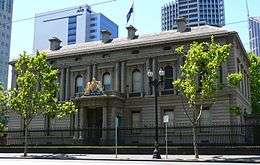Greek Precinct, Melbourne
The Greek Precinct, Melbourne in Victoria, Australia, is a Greek cultural area centred on the eastern end of Lonsdale Street in the Melbourne city centre.[1] The area runs adjacent to Melbourne Chinatown on Little Bourke Street.
According to the 2001 Australian census, Melbourne has the largest Greek Australian population in Australia (151,785 or around 47%),[2] and the largest Greek population of any city in the world – outside Greece. Economic bilateral relations between Australia and Greece are worth over A$140 million. Greek Ministry of Foreign Affairs. "Bilateral relations between Greece and Australia". Archived from the original on 7 May 2008. Retrieved 7 August 2009.</ref>
Melbourne is also a sister city to Thessaloniki,[3] Greece’s second-largest city.
The Precinct
The Greek Precinct is located between Swanston Street and Russell Street, along Lonsdale Street, in the Melbourne city centre. It is home to many Greek restaurants and Greek cultural shops. Located on the corner of Lonsdale Street and Russell Street is the Greek Community Centre of Melbourne,[4] and at 209 Lonsdale Street is the Sam Papasavas Building - the home of the Australia-Greek Learning and Resource Centre of the Royal Melbourne Institute of Technology (RMIT).[5]
Located nearby, on the corner of La Trobe Street and William Street, is the Hellenic Foundation for Culture's centre and the Hellenic Museum of Melbourne.[6] Both the centre and museum are housed in the historic former Melbourne Mint, and is contiguous with the National Centre for Hellenic Studies and Research of La Trobe University.[7]
In March 2009, the Government of Victoria and the City of Melbourne announced that the Greek Precinct would receive a A$3.5 million rejuvenation.[8]
Antipodes Festival
The annual Melbourne Antipodes Festival is held on Lonsdale Street over a week in March, and has been held since 1987. The festival is renowned for its Lonsdale Street "Glendi" (Greek for "party") - a weekend-long event that is held to coincide with the Greek National Day (25 March).[9]
Antipodes brings a weekend of Greek culture, food and entertainment to Melbourne's historic Greek Precinct. The festival features three stages of free entertainment, children's rides and activities and over 60 food, drink and craft stalls. [10]
The annual Greek Film Festival is held in Melbourne over two weeks in September, and has been held since 1990.[11]
Gallery
 Monument to the Melbourne-Thessaloniki sister city relationship
Monument to the Melbourne-Thessaloniki sister city relationship The historic former Melbourne Mint, which now houses a Greek cultural centre and a museum
The historic former Melbourne Mint, which now houses a Greek cultural centre and a museum Fire dancing at the 2009 Lonsdale Street Glendi
Fire dancing at the 2009 Lonsdale Street Glendi
See also
- Greek community of Melbourne
- Lonsdale Street, Melbourne
- Greek Australian
- Thessaloniki
References
- "Greek precinct". City of Melbourne What's On. Retrieved 15 April 2019.
- Lazzaro, Vince (11 February 2003). "Melbourne 2001 Census" (PDF). 2001 Australian Census. Canberra, ACT, Australia: Australian Bureau of Statistics. 1 (2030.2): 92. Retrieved 7 August 2009.
- City of Melbourne. "International relations - Thessaloniki". Retrieved 7 August 2009.
- "Greek Community of Melbourne and Victoria homepage". Retrieved 7 August 2009.
- Collections Australia Network. "Australian-Greek Resource and Learning Centre, RMIT". Retrieved 7 August 2009.
- Hellenic Foundation for Culture. "Centres: Melbourne". Retrieved 7 August 2009.
- La Trobe University. "National Centre for Hellenic Studies and Research". Archived from the original on 8 September 2009. Retrieved 7 August 2009.
- Office of the Premier of Victoria. "$3.5m boost for Melbourne's Lonsdale Street Greek Precinct". Retrieved 7 August 2009.
- Melbourne Antipodes Festival. "Lonsdale Street Glendi". Retrieved 7 August 2009.
- Greek Centre for Contemporary Culture. "Lonsdale Street Greek Festival". Retrieved 3 August 2016.
- Melbourne Antipodes Festival. "Greek Film Festival". Retrieved 7 August 2009.
External links
| Wikimedia Commons has media related to Lonsdale Street Glendi. |
